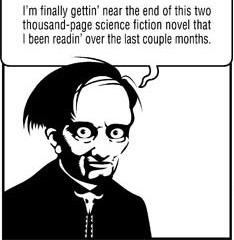Scott Adams Quotes - Page 3
Life is half delicious yogurt, half crap, and your job is to keep the plastic spoon in the yogurt.
Scott Adams (2007). “Stick to Drawing Comics, Monkey Brain!: Cartoonist Explains Cloning, Blouse Monsters, Voting Machines, Romance, Monkey G ods, How to Avoid Being Mistaken for a Rodent, and More”, p.222, Penguin
Scott Adams (1996). “The Dilbert principle: a cubicle's-eye view of bosses, meetings, management fads & other workplace afflictions”
Frankly, I’m suspicious of anyone who has a strong opinion on a complicated issue.
Scott Adams (2007). “Stick to Drawing Comics, Monkey Brain!: Cartoonist Explains Cloning, Blouse Monsters, Voting Machines, Romance, Monkey G ods, How to Avoid Being Mistaken for a Rodent, and More”, p.131, Penguin
I respectfully decline the invitation to join your hallucination.
Scott Adams (2012). “Dilbert 2.0: The Dot-com Bubble: 1998 TO 2000”, p.187, Andrews McMeel Publishing
Scott Adams (1996). “The Dilbert principle: a cubicle's-eye view of bosses, meetings, management fads & other workplace afflictions”
Consultants have credibility because they are not dumb enough to work at your company.
"The Dilbert principle: a cubicle's-eye view of bosses, meetings, management fads & other workplace afflictions".
I believe in karma... that means i can do bad things to you all day long and assume you deserve it.
Scott Adams (2007). “Stick to Drawing Comics, Monkey Brain!: Cartoonist Explains Cloning, Blouse Monsters, Voting Machines, Romance, Monkey G ods, How to Avoid Being Mistaken for a Rodent, and More”, p.438, Penguin
DNRC Newsletter #58, November 11, 2004.
The best any human can do is to pick a delusion that helps him get through the day
Scott Adams (2004). “God's Debris: A Thought Experiment”, p.29, Andrews McMeel Publishing







